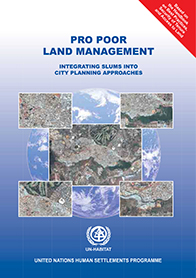Location
UN-Habitat is the United Nations programme working towards a better urban future.
Its mission is to promote socially and environmentally sustainable human settlements development and the achievement of adequate shelter for all. Cities are facing unprecedented demographic, environmental, economic, social and spatial challenges. There has been a phenomenal shift towards urbanization, with 6 out of every 10 people in the world expected to reside in urban areas by 2030. Over 90 per cent of this growth will take place in Africa, Asia, Latin America, and the Caribbean. In the absence of effective urban planning, the consequences of this rapid urbanization will be dramatic. In many places around the world, the effects can already be felt: lack of proper housing and growth of slums, inadequate and out-dated infrastructure – be it roads, public transport, water, sanitation, or electricity – escalating poverty and unemployment, safety and crime problems, pollution and health issues, as well as poorly managed natural or man-made disasters and other catastrophes due to the effects of climate change. Mindsets, policies, and approaches towards urbanization need to change in order for the growth of cities and urban areas to be turned into opportunities that will leave nobody behind. UN-Habitat, the United Nations programme for human settlements, is at the helm of that change, assuming a natural leadership and catalytic role in urban matters. Mandated by the UN General Assembly in 1978 to address the issues of urban growth, it is a knowledgeable institution on urban development processes, and understands the aspirations of cities and their residents. For close to forty years, UN-Habitat has been working in human settlements throughout the world, focusing on building a brighter future for villages, towns, and cities of all sizes. Because of these four decades of extensive experience, from the highest levels of policy to a range of specific technical issues, UN-Habitat has gained a unique and a universally acknowledged expertise in all things urban. This has placed UN-Habitat in the best position to provide answers and achievable solutions to the current challenges faced by our cities. UN-Habitat is capitalizing on its experience and position to work with partners in order to formulate the urban vision of tomorrow. It works to ensure that cities become inclusive and affordable drivers of economic growth and social development.
Members:
Resources
Displaying 191 - 195 of 223Land tenure, housing rights and gender
This document is a chapter in a larger report commissioned by UN habitat to review the laws and land tenure of Lesotho, Mozambique, Namibia and Zambia. The report provides a brief historical background, snapshots of how the government and legal systems operate, reviews land tenure, the various types of land in the country and the relevant constitutional provisions laws and policies. The chapter also examines housing rights and accessibility of services.
Shared Tenure Options for Women: A Global Overview
Provides an overview of different forms of shared tenure, whether between husband and wife, stable partners, extended families, women’s groups or communities. Analyses to what extent they are beneficial to women. Includes a preliminary examination of the impact of shared tenure on women’s effective land and housing rights, on women’s access to credit and on domestic violence. Seeks to contribute to the development of tools and strategies towards women’s security of tenure.
Pro Poor Land Management: Integrating Slums into City Planning Approaches
This publication on Pro Poor Land Management is based on the Handbook on Best Practices, Security of Tenure and Access to Land. It briefly describes recent innovations at the global level in the field of pro poor land management. It shows how governments, including local government and other stakeholders, are coming to grips with implementing the land related principles enshrined in the Habitat Agenda at a practical level in the cities and towns.
Urban Land for All
This document consists of a synthesis of different types of policy instruments that could be used by government officials to introduce more appropriate and flexible tenure systems, uphold the rights of the urban poor, and secure urban land for slum dwellers.
Land in Africa: market asset or secure livelihood?
This document summarises the proceedings from a conference organised by International Institute for Environment and Development (IIED) , Natural Resource insitute (NRI) and the Royal African Society in November 2004.The conference brought together a wide range of interest groups including, African policy makers, academics and civil society representatives, as well as representatives of the private sector and international agencies, to debate the way ahead for land rights and land reforms in Africa.




